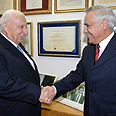
Now that Prime Minister Ariel Sharon has finally left a party that left him a long time ago, and Amir Peretz has grabbed a party that had left the political arena a long time ago, the media both locally and internationally are reacting as if something truly terrible has happened.
Words like instability, earthquake, shocker and revolution are being bandied about. Don't we want debate, change, movement and energy? Isn't that what democracy and life are all about about? There's a great deal of stability in countries like Libya and North Korea, but you wouldn't want to live there, would you?
The problem is democratic political change is not really in our tradition, and it is a bit scary.
Some perspective: The history of moderately self-governing Jewish communities in Europe and Asia in the bad old days isn't particularly encouraging.
In Salonika, home to a Jewish community for hundreds of years congregations were constantly being formed by groups who came from the same city or country, and they then divided further into sections and factions that quarreled, seceded, built new congregations, and so on.
Jewish settlements in the cities and towns of the Muslim Middle East were far from being united. In accordance with old traditions, every new wave of settlers continued its separate life in its own kahal (community), according to the Encyclopedia Judaica.
Elsewhere, the situation was even more complicated.
Tzefat had 12 congregations in the 16th century.
Istanbul had 40. Don't even get me started on talking about the communities in Poland and Lithuania, where the oligarchical rule of the medieval era kept rigid control of religious behavior and economic and social life far too long.
By the 1800s, Jewish communities in Europe were facing economic ruin, oligarchic mismanagement, class struggle, rationalist enlightenment, stupendous debts from deficit financing that transferred fiscal burdens to coming generations, tax exemptions for the wealthy, unbearable tax burdens (doesn't sound that different from today in Israel, does it?), the encyclopedia says.
Is Sharon's move really shocking?
Israel's founders came out of that mess of factions, constantly warring, splitting and denouncing each other. No polite, civil Anglo-Saxon disputes for them (Of course, there was that infamous incident in the U.S. Senate in the mid-1800s when a congressman almost beat a senator to death with his cane over the latter's fiery abolitionist speeches, but that was when the U.S. was about as young, wild and divided as we are here today.).
But for all of the turmoil and tumult, there has never been a great deal of democracy in Jewish life. The rabbis, the rich, the learned have all led the people - sometimes well, sometimes not so well.
So, I guess it is understandable when the media trumpet Sharon's move as a "shocker." But was it really? He has been telegraphing his moves for months, as the Likud mainstream has moved farther and farther to the right, divided as it was over both the disengagement and the fear its party elites might lose their privileges.
Political arena needs reshuffling
And is it really any surprise that the energetic and capable Peretz was able to reorganize the Labor Party out from under its stumbling, tired and idea-deprived elites?
The paradigm shift in Israeli-Palestinian relations introduced by Sharon through the disengagement (let's not forget he basically adopted the idea from former Labor leader Amram Mitzna) is playing itself out on the domestic level, as well.
The relative breather from daily security risks has brought the continuing economic pressures on the working and middle classes from the restructuring of our economic situation to the forefront. Former Finance Minister Benjamin Netanyahu's reforms have been good for our international standing, but the benefits have yet to trickle down to hurting communities like Sderot, Peretz's hometown. That's always ripe territory for a fire-breathing populist like Mr. Mustache.
The political arena here is long overdue for a reshuffling. Both "ruling" parties have lost their way; the only thing keeping them in power is inertia and their activist bases.
Clear out the oligarchs, I say. Bring in some new ideas.
Alan D. Abbey is Founding Editor of Ynetnews.com. He can be reached at alanabbey@yahoo.com















